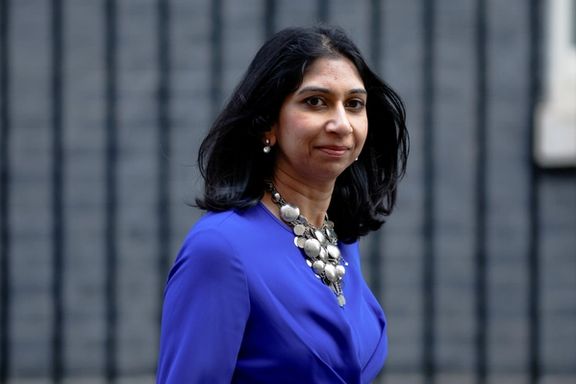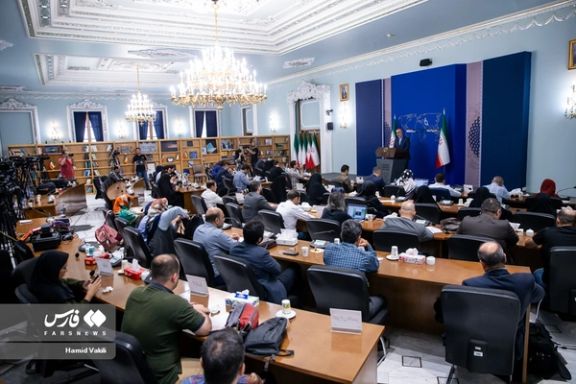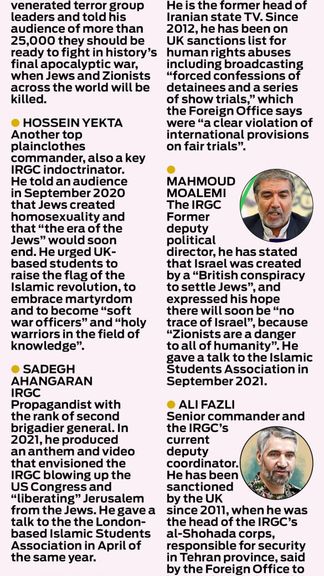UK Gov't Divided On Whether To Proscribe Iran's Guards

Britain says there is a split within the UK government over whether to proscribe Iran’s Revolutionary Guard despite the regime’s “significant threat” to the UK.

Britain says there is a split within the UK government over whether to proscribe Iran’s Revolutionary Guard despite the regime’s “significant threat” to the UK.
The office of the British Prime Minister reiterated Monday that the Islamic Republic regime poses a “significant threat” to the country with “direct threats” to dissidents living in the UK.
The statement by the 10 Downing Street came a day after reports emerged of Home Secretary Suella Braverman labeling the IRGC as “the single biggest threat” to Britain’s national security amid fresh evidence of its reach.
As pressure is growing on the British government to proscribe the IRGC, The Sunday Times quoted a source close to the home secretary as saying that “The Iranian threat is the one that worries us the most,” adding that Braverman fears that the outfit is stepping up its activities, attempting to recruit members of organized crime gangs to target opponents of the regime.
In November 2022, Iran International was warned by authorities that its journalists were under threat from Iranian agents and after initial security measures around its headquarters in London, the television network temporarily relocated its broadcasts to Washington DC. Later, one suspect was arrested and is facing trial.

British media quoted the Prime Minister's spokesman Max Blain as saying that London had already taken “strong action” against Tehran, but the government is divided whether the IRGC should be banned as a terrorist group, with the Foreign Office reportedly reluctant to back the move over fears it would cause lasting diplomatic damage. Last month, the British government again rejected calls to proscribe the IRGC as a terrorist group in favor of expanding the criteria by which its supporters and affiliated companies can be put under sanctions.
Asked if Braverman was echoing the government's view, the Prime Minister’s spokesman said, “Certainly we think that the behavior of the Iranian regime, including the actions of the IRGC, pose a significant threat to the safety and security of the UK and of our allies.”
Refraining from clarifying the opposing views about the designation of the IRGC, the spokesperson said, “I can’t get into speculation around who we may or may not be considering proscribing in the future.” But he said the government had “a range of tools at our disposal” and would make decisions based on using the most effective measures “to curb Iran’s destabilizing activity”.
The issue of nuclear proliferation and “direct threats against dissidents in the UK” were particularly concerning, the spokesman emphasized, highlighting the high number of threats to kill or kidnap British citizens or people based in the UK in just over a year.
“We’ve identified 15 credible threats by the Iranian regime to kill or kidnap British or UK-based individuals since 2022,” he said.
Referring to the measures taken by London, he said that “we have rightly taken strong action, including sanctions, and we’ve announced new powers to give the UK a greater ability to target Iran’s key decision makers.” “We have sanctions on 350 Iranian individuals and entities,” he underlined.
Earlier in the day, Iran’s Foreign Ministry spokesman Nasser Kanaani reacted to the statement attributed to UK Home Secretary Braverman, the UK is in no place to make such “baseless” claims.

“The UK is not in a position to make accusations against the IRGC with its dark history in West Asia, which has caused deep instability in the region, as well as its role in covert and overt support of terrorism,” Kanaani said during his weekly press briefing in Tehran on Monday, claiming that “The IRGC has provided many services not only to the regional countries but also to the European states.”
The remarks by Downing Street and Braverman came just after Iran's IRGC commanders were revealed to be spreading extremist antisemitic propaganda in UK universities via a London student organization. The Sunday Times disclosed details of the close relationship between the Islamic Republic and the Islamic Students Association set up to promote religious and political views of Ruhollah Khomeini, the founder and first Supreme Leader of the regime who ruled until his death in 1989.
According to an investigation by the Jewish Chronicle, since early 2020, at least eight IRGC leaders addressed British student audiences during events hosted by the center, trying to radicalize them.

In the wake of the new revelations, Sir Richard Dearlove, the former head of MI6, led calls to proscribe the IRGC to outlaw its propaganda activities. “The case for strong preventive action seems clear-cut,” he said.
Shadow foreign secretary David Lammy said, “The invitation of IRGC commanders and other speakers who glorify its actions to speak to British students is incredibly concerning. Robust action is needed now.”
Tory MP Alicia Kearns, the chair of the Foreign Affairs committee, condemned the organization's activities, stating, “In organizing such despicable talks, the Islamic Students Association of Britain acts at best as a willing propaganda arm of the Iranian regime, and at worst as an agitator for state sponsored terrorism.”